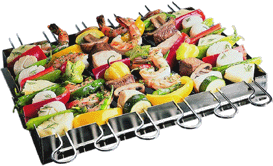Our mission for summer is to spice up the nation's barbecues.
But how do you get all those exciting flavours into your food? Well, there are 3 main choices - marinades, rubs and glazes.
Marinades
If you want to get flavour right into the meat you are cooking then soaking it in a marinade for a few hours is by far the best way. Not only do marinades flavour the food but they tenderise tough meat like lamb and moisturise dry meat like chicken.
A marinade is a mixture of spices and flavourings in a liquid. The liquid is most commonly a combination of oil and vinegar, lemon juice or yoghurt. It is the acidity in vinegar, lemon juice and yoghurt which tenderises the meat whereas the oil bastes the meat while it is cooking and keeps it moist.
To get the best results from a marinade the meat should be marinated for at least 2 hours and preferably 4 hours or more. Some recipes call for soaking overnight.
Marinades are not solely for use with meat. They also work with vegetables but are particularly good at flavouring bland non-meat products such paneer, Quorn and tofu.
Rubs and Pastes
Rubs do away with the liquid altogether. Dry spices are rubbed over the surface of the meat and their flavours are left, like marination, to permeate into the meat. Some rubs can be mixed into a stiff paste with oil and/or vinegar and then rubbed over the meat. Others can be semi-dry if ingredients liked garlic and ginger paste are added to the spices.
Glazes
Glazes give surface flavouring and do not penetrate into the meat at all. Glazes are thickened liquids which are brushed onto almost cooked meat and heated until they form a coating layer. Glazes can be quite sweet because they contain sugar as well as spices so they are only used towards the end of the cooking so the sugar doesn't burn before the meat is cooked through.
Cooking Kebabs
 the Barbecue Genius kebab rack |
The best thing I ever bought for the barbecue was this kebab rack made by Barbecue Genius. The rack itself sits on the barbecue's grill and the kebabs are threaded onto the rack's double-pronged skewers. Once the skewers are placed in the rack the kebabs don't actually touch the grill so they can't stick and get ruined because you have to rip them off when you want to turn them over. And when you do want to turn them over you just give the skewers a quick twist. Even if you don't buy a kebab rack I would urge you buy some double-pronged skewers like those shown in the picture. The skewers have two thin round blades instead of one flat blade so when you turn over the kebabs the pieces all rotate at the same time rather than spinning around on the skewer itself. If you are not using a rack then be sure to oil the grill before you sit the kebabs on it. Take a wad of kitchen paper, soak the underside with vegetable oil and rub the oiled paper over the grill mesh. Use lots of paper to keep your hand away from the heat. |
Top Tips for Kebabs
I have two tried and tested tips to keep you out of trouble when making kebabs.
Firstly, when using garlic crush the garlic right down into a paste so you don't leave any little chunks on the surface of the meat. Garlic turns quite bitter when burnt and the last thing your kebabs need is a horrid bitter coating. If you don't want to go to the trouble of using a pestle and mortar I have found the best way to quickly get garlic paste is to grate the cloves of garlic on the finest mesh on your grater. Then discard any solid bits you have left over. Otherwise, use a proprietary garlic crusher and mash the resulting bits with the back of a fork.
Secondly, salt. Be careful how and when you use it. Salt draws moisture out of the meat and makes small chunks like kebabs go dry. The water from the meat then ends up in the marinade making it all runny and diluting the flavour.
Most commercially prepared rubs contain lots of salt and so are only suitable for larger cuts of meat which are going to be cooked slowly in a large, enclosed barbecue Using these rubs on kebabs would be a disaster unless you're blending your own rub and can leave out the salt.
We all know salt enhances the flavour of food so what do you do? The answer is to add salt to the marinade just before you are ready to cook. Mix the salt into the marinade until it is all dissolved and then skewer up the meat for cooking. If you're using a dry rub then simply sprinkle salt directly over the meat just before you start grilling on the barbecue.
